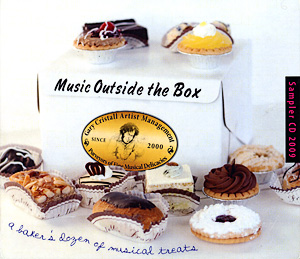|
Home Contact: Phone: Email:
|
||
|
|
||
|
||||
|
Lee Pui Ming was born in Hong Kong in 1956. Her mother was a voice teacher who taught popular Chinese songs. At the age of 3 she started to study piano. In 1976 she left Hong Kong for music studies in the United States, acquiring a Bachelors, Masters, and most of a Doctorate. There she discovered jazz. McCoy Tyner and Herbie Hancock joined Prokofiev and Bartok in her galaxy of influences. But as she grew musically, Pui Ming decided she wanted to make her own music rather than reading the scores of others. In1985 Pui Ming came to Toronto and a new life as a composer, teacher, and performer. In Toronto all the music in her head came together- Chinese traditional and pop music she had heard growing up, the European classical music she had spent almost her entire life studying, and the jazz she had been listening to more and more of. She finally found the freedom and confidence to play on the keyboard what she felt in her heart. In 1991 she released her first recording, Ming. She was launched. The years since that debut have been good ones. In Toronto, Winnipeg, Montreal, and Vancouver Pui Ming found other experimenters, other refugees from the predictable. She also found audiences at festivals and concerts, from Whitehorse and Halifax to Berlin and Zurich- audiences who “got it”, who were prepared to open their ears to something unusual and special, music that defies all borders. In Vancouver she met the Vancouver Chinese Music Ensemble and percussionist Sal Ferreras, with whom she toured and recorded, winning a JUNO nomination for their recording- Nine-Fold Heart. In 1999 she made a long journey to different regions of China where she studied, composed and recorded with Chinese traditional artists. The result, Taklamakan, won rave reviews, including the “Top Ten of 1999” list of Vancouver’s Georgia Straight. In Toronto she has performed with percussionist Mark Duggan and violinist David Prentice, and composed for and played with Forty Fingers Saxophone Quartet. Montreal’s musique actuelle community has embraced her. She has worked with luminaries including Jean Derome, Pierre Tanguay, and Rene Lussier and recently has collaborated on a number of performance projects with saxophonist/vocalist Joane Hetu. In 2002, Pui Ming released her latest CD, a series of improvisations, mainly for solo piano, voice and miscellaneous objects. Released on Montreal’s Ambiances Magnetiques label, who’s playing is finding a rapturous reception both at home and abroad. “Une revelation- ni plus, ni moins!” (A revelation- no more, no less!) is how one reviewer from France summed it up. This last year has been the busiest yet for Lee Pui Ming. In February she gave her CD launch concert in Toronto before heading west in March to play a series of solo concerts in small communities in Manitoba and Alberta. April was taken up with the creation of Hundun. Funded by the Canada Council for the Arts, the Ontario Arts Council, the Toronto Arts Council and the Laidlaw Foundation, Hundun marks the most ambitious project Pui Ming has yet undertaken. Based on an ancient Chinese legend, Hundun features eight musicians and dancers engaged in both music and dance. Hundun played for three nights in Toronto in May and was performed at the Guelph Jazz Festival in September. In May, Pui Ming also performed at the Musiques de creation Festival in Jonquiere, Quebec, and at the Canvas Festival in Montreal. In June she returned to Montreal to perform at the first Off Jazz Festival. Lee Pui Ming’s 2002 composing activities have been prodigious. In addition to the one hour plus Hundun, she has been commissioned to write a 20 minute piece for Toronto’s Evergreen Club Gamelan; a one-hour dance piece for Vancouver’s Kokoro Dance, and a 25-minute dance piece commissioned by CanAsian Dance. Her work for solo zheng was premiered at October’s Vancouver New Music Festival where Pui Ming gave her own solo concert as well. |
||||


 Lee
Pui Ming’s music is about going beyond boundaries. It is about transcending
the myriad of genres, niches, and pigeonholes that trap music and
seek to name it and tame it. Lee Pui Ming is accustomed to being
defined as indefinable. Critics, presenters and audiences often
ask: What kind of music do you play? Is it classical, jazz, world
music, folk music? Lee Pui Ming could simply answer – Yes! For
all these styles have contributed to her compositions and improvisations.
What does she play? European, North American, and Asian music from
the most traditional to the most contemporary; music that is sometimes
composed and often improvised; music that uses the voice, body and
piano in unorthodox ways that challenge preconceptions about what
music should be. Lee Pui Ming plays music of her own creation that
is filtered through the mind, hands, and voice of an uncommonly
fearless artist determined to make her very own way in the musical
world.
Lee
Pui Ming’s music is about going beyond boundaries. It is about transcending
the myriad of genres, niches, and pigeonholes that trap music and
seek to name it and tame it. Lee Pui Ming is accustomed to being
defined as indefinable. Critics, presenters and audiences often
ask: What kind of music do you play? Is it classical, jazz, world
music, folk music? Lee Pui Ming could simply answer – Yes! For
all these styles have contributed to her compositions and improvisations.
What does she play? European, North American, and Asian music from
the most traditional to the most contemporary; music that is sometimes
composed and often improvised; music that uses the voice, body and
piano in unorthodox ways that challenge preconceptions about what
music should be. Lee Pui Ming plays music of her own creation that
is filtered through the mind, hands, and voice of an uncommonly
fearless artist determined to make her very own way in the musical
world.